Overview
The article focuses on best practices for managing clinical trial supplies, emphasizing the importance of efficient logistics, regulatory compliance, vendor selection, and the integration of technology. It supports this by detailing strategies such as implementing advanced inventory control systems, fostering strong vendor relationships, and leveraging digital technologies to enhance resource oversight, which are crucial for ensuring the success and integrity of clinical studies.
Introduction
In the intricate world of clinical trials, the management of supplies is a pivotal element that can significantly influence research outcomes. From investigational medicinal products to essential logistics, the effectiveness of these operations is paramount for ensuring trials run smoothly and meet regulatory standards.
As the demand for efficient clinical trial logistics escalates, understanding the nuances of supply chain management becomes crucial. This article delves into the multifaceted aspects of clinical trial supplies, exploring best practices, regulatory compliance, and the transformative role technology plays in enhancing operational efficiency.
By examining these elements, organizations can better navigate the complexities of clinical trials, ultimately driving advancements in healthcare and contributing to economic growth.
Understanding Clinical Trial Supplies: A Foundation for Success
Clinical trial supplies encompass a varied collection of materials essential for performing studies efficiently, such as investigational medicinal products (IMPs), placebos, syringes, vials, and storage equipment. A recent report shows that logistics and services represented the largest portion of 25% in the supply chain market for medical studies in 2023, highlighting the increasing significance of efficient supply coordination. Our extensive clinical research oversight services encompass:
- Feasibility studies
- Site selection
- Compliance reviews
- Study setup
- Import permits
- Project coordination
- Careful reporting
All of which are vital for the success of clinical studies.
The compliance review process is essential as it ensures that all study documents meet regulatory standards, thereby safeguarding the integrity of the study. Implementing an advanced inventory control system, such as Cloudbyz EDC 2.0, is essential for monitoring these resources and ensuring that nothing is missed. This creative system improves data handling abilities, enabling better coordination of resource availability with testing schedules.
Any shortages can severely jeopardize the integrity and continuity of the study, impacting outcomes significantly. Moreover, as emphasized by Novartis Ag's investment of around USD 13 billion in R&D in 2022, effective logistics oversight for clinical trial supplies is essential to the success of research. The strategic acquisition of Bomi Group by UPS in August 2022 underscores how enhancing logistics capabilities can expand healthcare networks and add temperature-controlled facilities across 14 countries.
Such advancements not only enhance service range and efficiency but also play a crucial role in managing clinical trial supplies, ensuring the timely delivery of temperature-sensitive products, which is essential for maintaining integrity. These comprehensive services and strategic advancements have a significant impact on local economies, fostering job creation, promoting economic growth, and enhancing healthcare improvement through international collaboration.
Navigating the Complexities of Clinical Trial Logistics
Efficient logistics coordination for clinical trial supplies in medical studies requires a significant degree of careful planning and execution. Our extensive clinical study oversight services include:
- Feasibility and selection of research locations and principal investigators (PIs)
- Compliance evaluations of study documents
- Study setup
- Procurement of import permits for investigational devices
Furthermore, we offer comprehensive reporting on study status, inventory, and both serious and non-serious adverse events, which are essential for efficient resource oversight.
The geographical distribution of testing locations, the need to manage temperature-sensitive clinical trial supplies, and compliance with customs regulations are factors that can significantly complicate the management of clinical trial supplies. In 2024, the environment of medical research logistics keeps changing, with notable difficulties arising alongside fresh possibilities. For instance, the cardiovascular diseases segment alone is projected to account for USD 1,286.8 million, highlighting the increasing demand for efficient logistics solutions in this area, which in turn supports job creation and economic growth in local communities.
To navigate these complexities, fostering robust relationships with logistics partners who possess a deep understanding of the unique demands of clinical trial supplies is essential. Moreover, implementing a centralized tracking system can significantly enhance visibility into inventory status, allowing for proactive adjustments to any logistical issues that may arise. This method not only streamlines operations but also ensures that temperature-sensitive products are managed effectively, maintaining the integrity of essential research materials.
Contingency planning must also be a cornerstone of logistics strategy; anticipating potential disruptions and having backup strategies in place are vital to ensuring that clinical trial supplies reach study sites in a timely manner. Recent advancements in digital technologies, such as AI and blockchain, have demonstrated potential in enhancing logistics oversight in clinical studies, yet they also require new skills for successful implementation. The case study titled 'Impact of Digital Technologies on Clinical Trials' illustrates how these tools enhance participant recruitment and data handling, emphasizing the need for guidance in their use.
Moreover, the recent decline in the number of Clinical Research Nurses (CRNs) in the United States raises concerns about the future of the profession and the potential impact on study logistics.
As articulated in the Declaration of Helsinki, 'Medical research involving human subjects must be conducted only by individuals with the appropriate ethics and scientific education, training, and qualifications.' This underscores the importance of knowledgeable oversight in logistics management. By adopting these best practices, including the review and feedback on study documents, research logistics can be optimized, mitigating risks and enhancing overall efficiency while contributing to healthcare improvement and international collaboration.
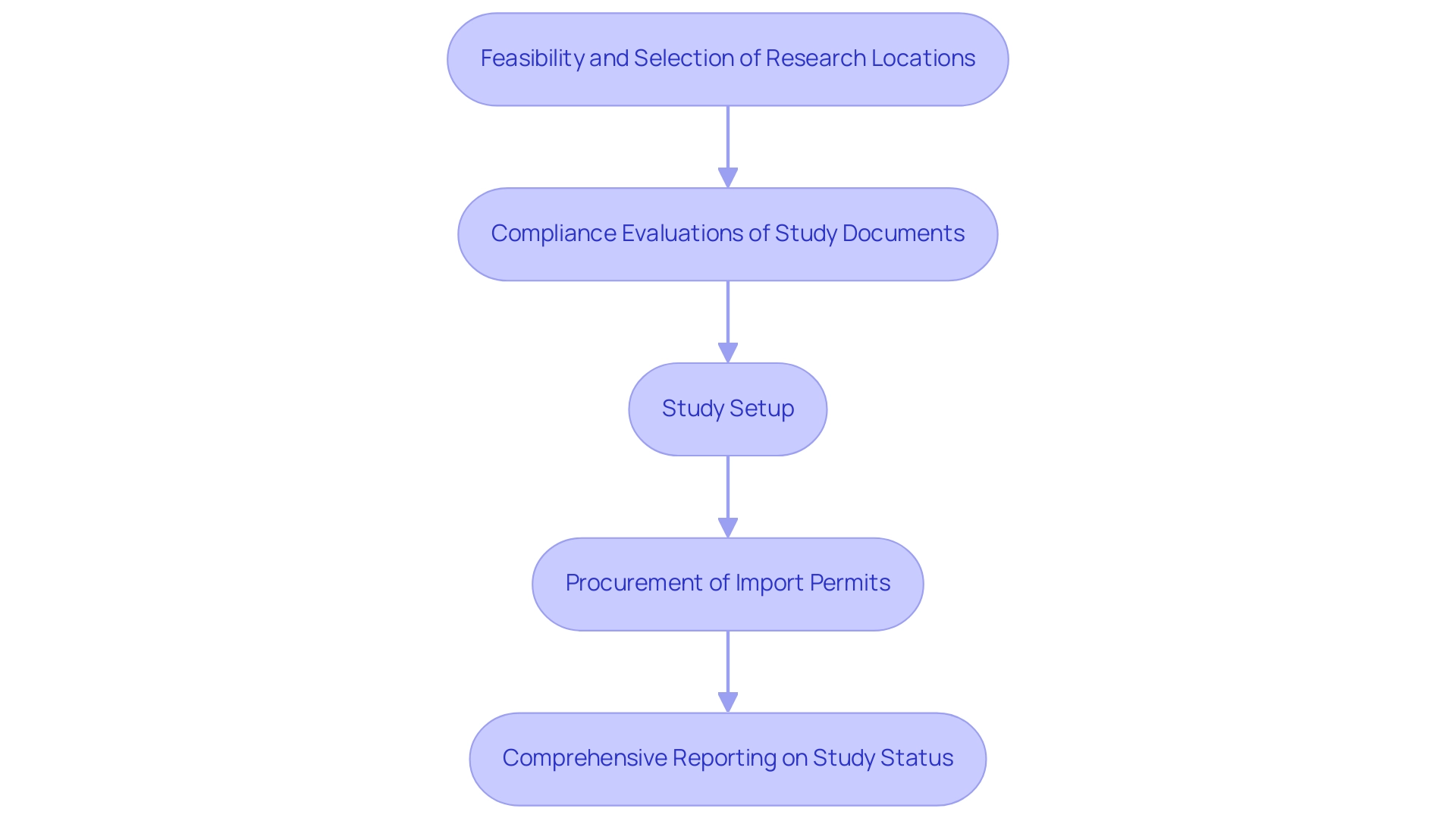
Ensuring Regulatory Compliance in Clinical Trial Supplies
Regulatory compliance stands as a cornerstone for maintaining the integrity of clinical trials in the Latin American Medtech landscape. It is imperative that all clinical trial supplies are sourced from approved manufacturers and adhere to Good Manufacturing Practice (GMP) and Good Distribution Practice (GDP) standards. Regular audits of suppliers are essential for verifying compliance, while meticulous documentation of all supply chain activities related to clinical trial supplies—including batch records and distribution logs—serves as a critical safeguard.
Notably, regulatory guidelines stipulate that applicable records of ethics committee activities must be retained for a minimum of three years following the completion of research. Furthermore, compensation disclosure is required if no compensation is available for trial-related injuries, ensuring transparency and accountability. The medical research landscape faces challenges due to complex protocols and limited research sites, as highlighted in the case study on research site readiness, emphasizing the need for effective site enablement strategies to enhance compliance and improve participant recruitment.
To cultivate a robust culture of compliance, training staff on regulatory requirements is non-negotiable. As Saravanan insightfully noted, 'Two-thirds of corporate risk and compliance professionals agree that their organization has a duty to stakeholders and society to address ESG-related issues.' Additionally, 77% of corporate risk and compliance professionals find it important to stay updated on ESG developments, further underscoring the relevance of compliance in today’s regulatory environment.
By prioritizing compliance with regulatory standards and utilizing local knowledge, such as Katherine Ruiz's expertise in regulatory matters for medical devices and in vitro diagnostics in Colombia, organizations can effectively manage clinical trial supplies to mitigate risks that may lead to expensive delays or penalties, ultimately ensuring the successful implementation of research studies. Our extensive service capabilities encompass:
- Feasibility and selection of research locations and principal investigators (PIs)
- Review and feedback on study documents to adhere to country requirements
- Setup, project management, and reporting on study status, inventory, and adverse events
By documenting study activities and compliance reviews, organizations can enhance their operational efficiency and maintain high standards of regulatory compliance.
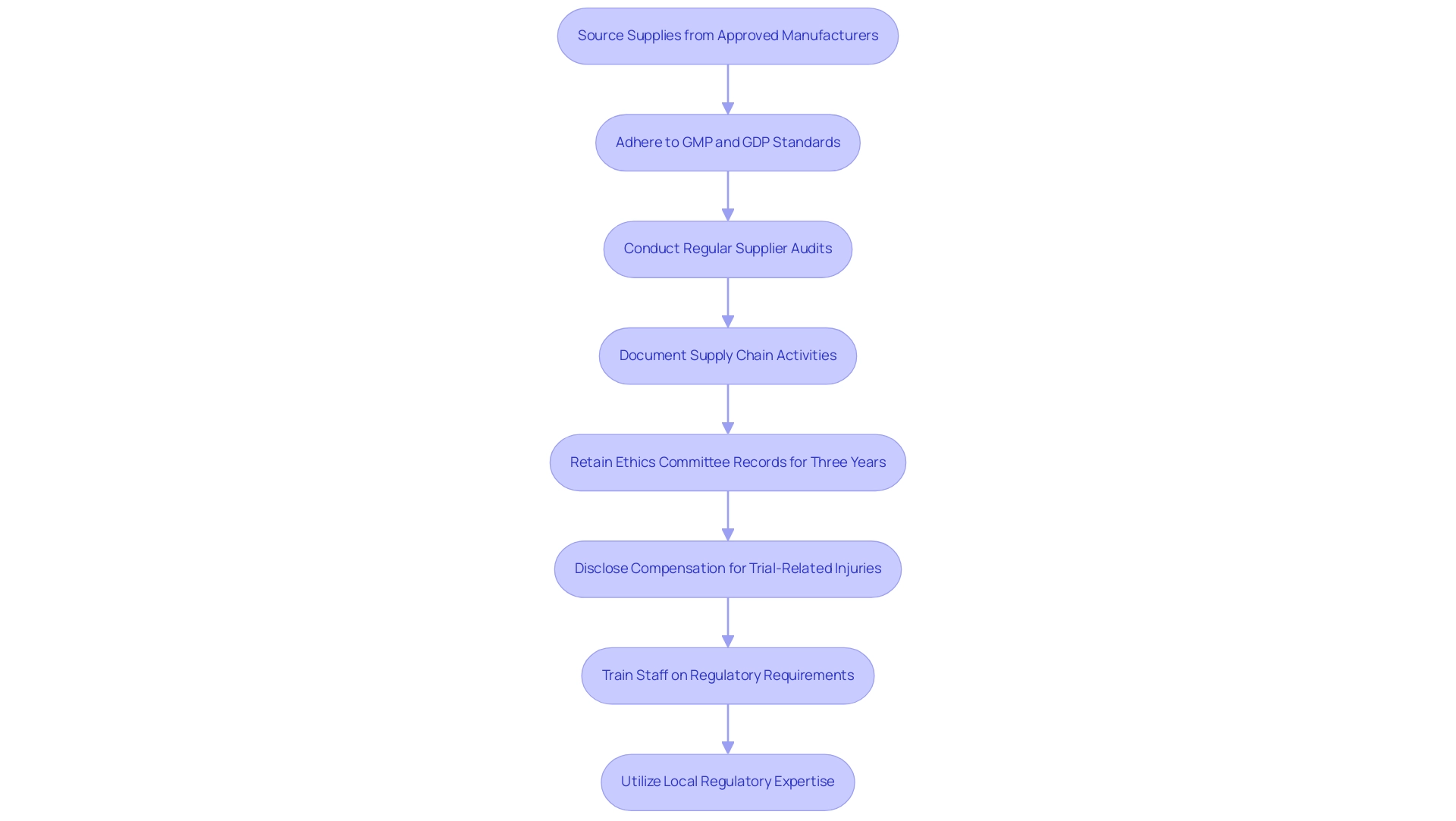
Best Practices for Vendor Selection and Management in Clinical Trials
Choosing the appropriate suppliers for clinical trial supplies requires a thorough assessment of their abilities, quality benchmarks, and past performance. This encompasses evaluating their alignment with essential services such as:
- Feasibility studies
- Investigator selection
- Compliance reviews
- Setup
- Import permits
- Regulatory approvals
Particularly within the context of Colombia's advantages like cost efficiency and regulatory speed. Establishing a strong selection process is crucial, which should incorporate:
- Site visits
- Quality audits
- Reference checks
To confirm the vendor's adherence to research requirements.
Effective vendor oversight is paramount; as emphasized by practitioners at Veramed,
Their support has been instrumental in achieving our organizational goals.
This illustrates that fostering collaboration through open lines of communication can lead to timely problem resolution and a strong partnership. Furthermore, efficient supplier management of clinical trial supplies is essential in lowering expenses and improving patient safety, which are important factors in research trials.
Establishing clear performance metrics, such as adherence to timelines, quality of clinical trial supplies, compliance with regulatory standards, and thorough reporting on study status and adverse events, is crucial for the ongoing evaluation of vendor performance. These metrics assist in ensuring that vendors meet the required standards and can be aligned with the 66 acronyms and abbreviations frequently used in the research domain, which often define critical performance indicators. Furthermore, the significance of adhering to national regulations cannot be overstated, as it is crucial for safeguarding participants and ensuring successful outcomes.
Such strategic vendor partnerships not only improve operational efficiency but also contribute to the overall quality of research materials, ultimately fostering job creation and economic growth in the local market. Recent trends highlight the necessity for these practices, especially as the research landscape evolves.
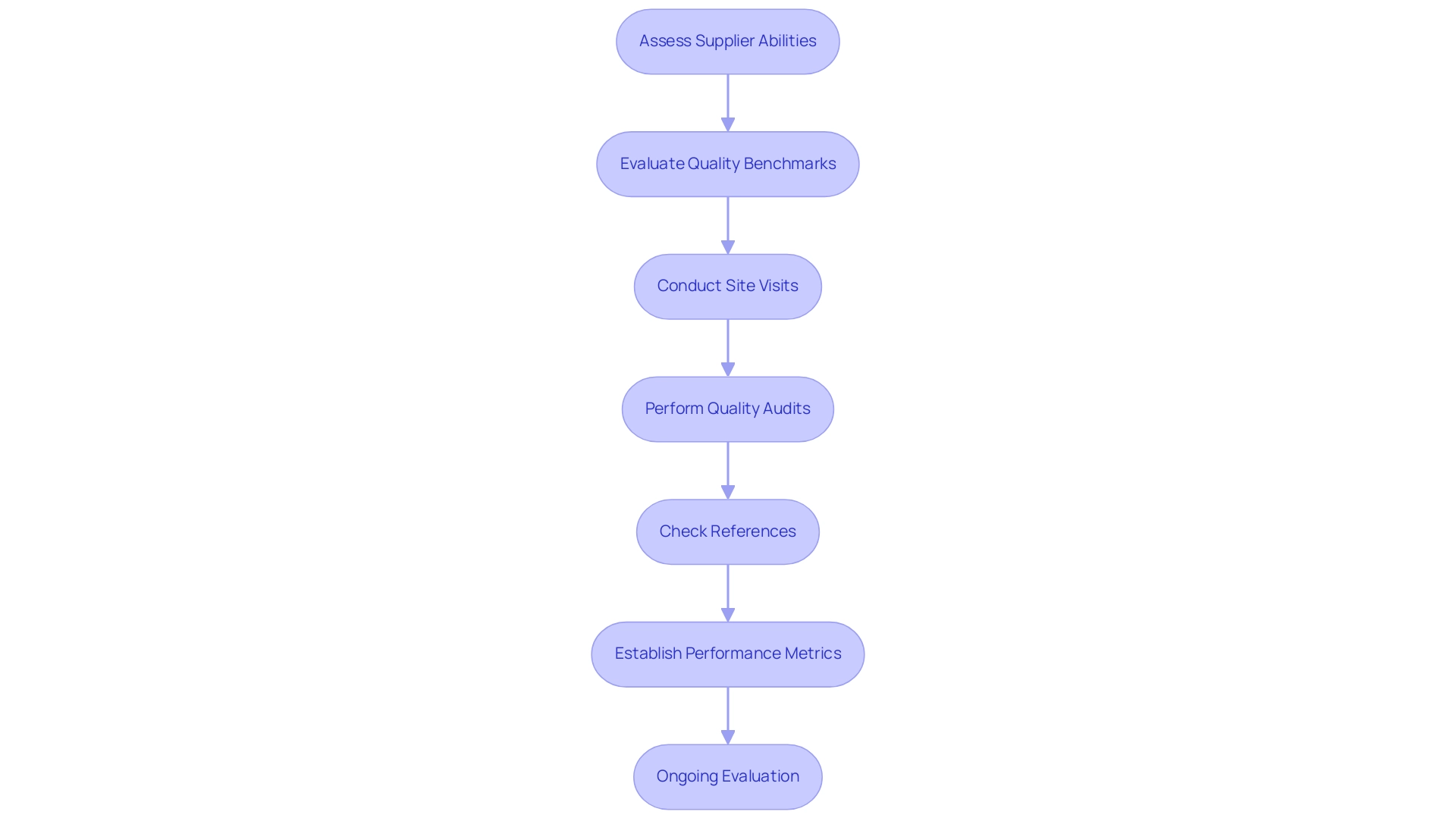
Fostering Effective Communication and Collaboration in Clinical Trials
Effective communication is essential in the field of clinical trial supplies coordination, where collaboration among research teams, vendors, regulatory bodies, and ethics committees is vital for operational efficiency. Our comprehensive service capabilities ensure a smooth process through:
- Feasibility studies
- Site selection
- Compliance reviews
- Efficient trial setup, including obtaining necessary import permits
Additionally, we offer comprehensive reporting on study status, inventory oversight, and tracking of serious and non-serious adverse events.
Regular meetings and timely updates keep all parties informed about supply statuses, potential challenges, and any protocol changes. Utilizing collaborative tools like project organization software can enable real-time communication and simplify document sharing, improving the overall workflow. As Barbara Farrell notes, Francis et al. proposed viewing clinical studies through a business management lens, emphasizing that successful studies encompass dimensions like effective communication, strategic marketing, and ongoing stakeholder management.
In the context of Medtech, these successful studies not only drive healthcare improvements but also foster job creation and economic growth within local communities. Furthermore, addressing operational aspects such as the imputation of missing data and conducting sensitivity analyses can provide valuable insights into the robustness of study results.
By fostering an environment of open dialogue, challenges can be identified early, enabling teams to collectively devise solutions. This proactive strategy ultimately leads to more successful study results, emphasizing the significance of cooperation among all research stakeholders.
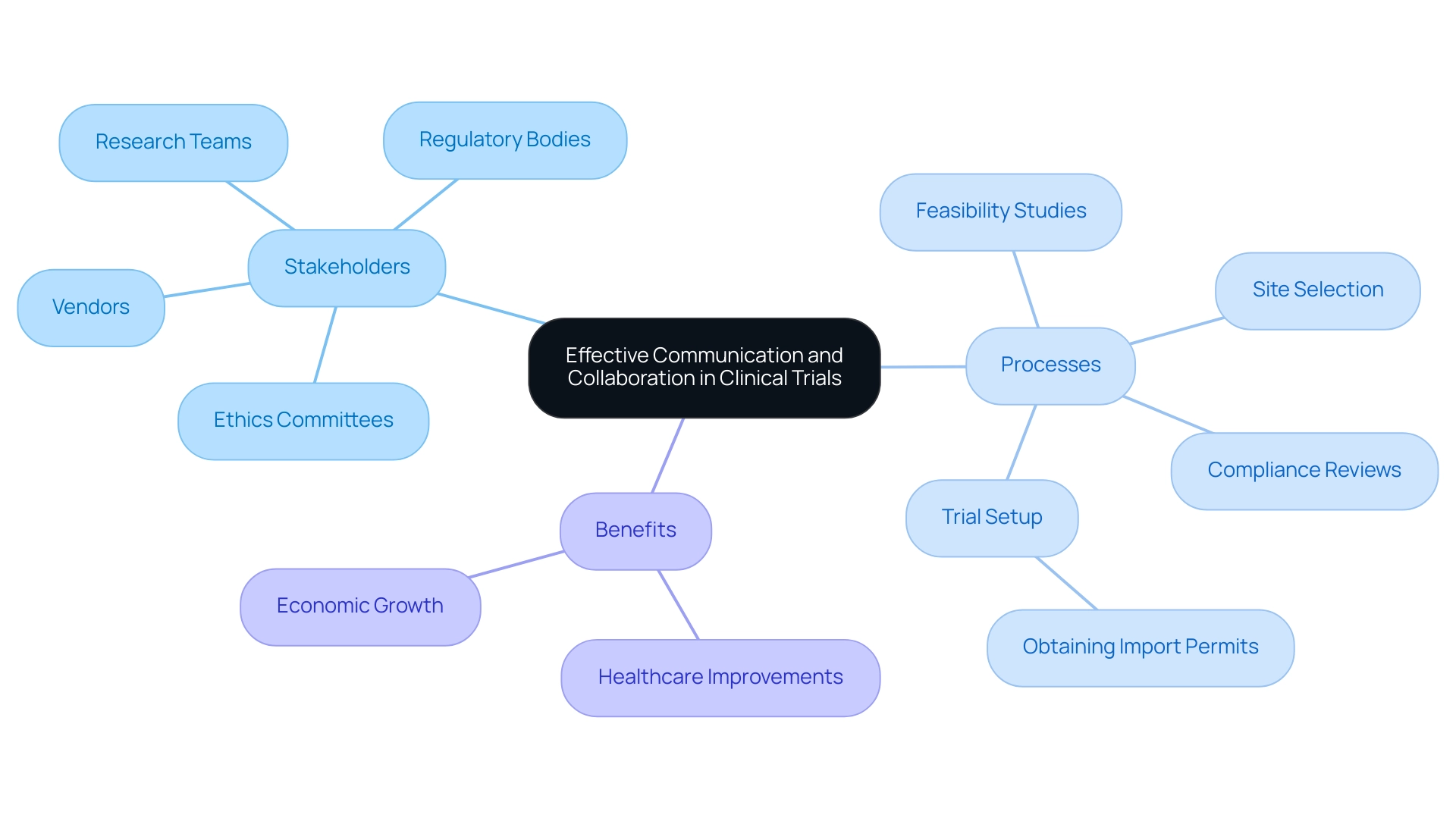
Leveraging Technology for Enhanced Clinical Trial Supply Management
The incorporation of technology into the coordination of clinical trial supplies is reshaping the environment, leading to substantial enhancements in efficiency and precision. Our extensive service capabilities encompass:
- Feasibility studies
- Selection of research locations and principal investigators (PI)
- Compliance reviews to ensure all study documents meet national requirements
- Setup, import permits, and reporting processes
Electronic inventory management systems enable real-time monitoring of clinical trial supplies, mitigating the risks associated with stockouts and overstocking—critical as organizations aim to maintain optimal inventory levels throughout the trial process.
Furthermore, leveraging data analytics allows for precise forecasting of resource needs by analyzing historical data trends, thus enhancing planning capabilities. It is essential to consider the ethical implications of these technologies, particularly regarding informed consent and participant privacy, as highlighted in the discussions surrounding digital medical research. The potential of blockchain technology also merits consideration; it provides a decentralized and secure method for tracking chains, crucial for maintaining data integrity and compliance with regulatory standards.
As noted by a global collaborative team at the University of Texas at Austin, they analyzed 1 billion possible molecules to select the 30 most promising ones for further drug development consideration. This level of analytical rigor exemplifies the current technological advancements that can be utilized in medical studies. Furthermore, extensive observational groups like the Million Veteran Program and the All of Us study, which engage 1 million participants utilizing mobile technology for all research procedures and data gathering, demonstrate the efficacy of technology in managing resources on a large scale.
By embracing these state-of-the-art solutions, organizations are well-positioned to enhance resource oversight processes and elevate overall experimentation results, particularly in managing clinical trial supplies, advancing global health enhancement through international cooperation and innovation in Medtech.
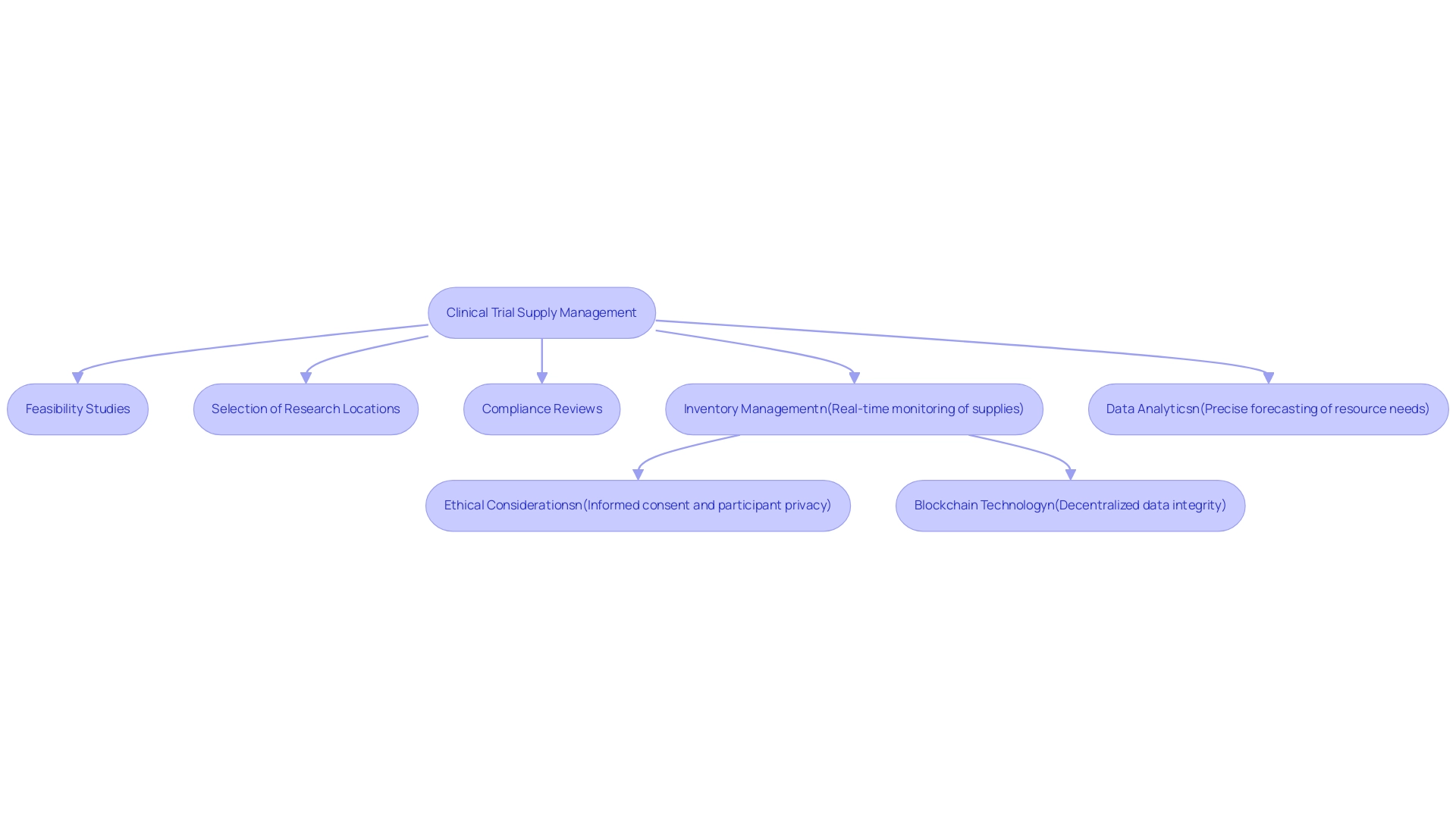
Strategic Planning and Forecasting for Clinical Trial Supplies
Efficient strategic planning and forecasting are crucial elements of successful management of medical research resources. Starting the process entails a thorough examination of the protocol to clearly determine the needs for clinical trial supplies and set timelines. Given the complexity of contemporary clinical studies, which involve multiple stakeholders such as sponsors, CROs, and various laboratories, it is crucial to ensure effective collaboration to avoid disruptions.
Our service capabilities encompass:
- Feasibility studies
- Selection of research locations
- Lead investigators
These establish the foundation for successful experiments. Utilizing historical data from past experiments can significantly improve forecasting accuracy, especially when taking into account factors such as patient recruitment rates and site locations. Kristel Rens from J&J Innovative Medicine raises an important question:
Why should pharma companies strive for more sustainable clinical trials?
And how can digitalizing drug forecasting reduce waste in the distribution chain? Emphasizing collaboration with vendors early in the planning phase is crucial to ensure that resource needs can be met efficiently. Our offerings also include:
- Compliance reviews on study documents to meet country requirements
- Setup
- Obtaining necessary import permits
- Nationalization of investigational devices
This further streamlines the process.
Furthermore, we offer extensive reporting on:
- Study status
- Inventory management
- Serious and non-serious adverse events
This is crucial for tracking progress and ensuring that resources align with the project's changing requirements. Consistently reviewing and modifying predictions based on real-time information and continuous experiment advancement is essential to guarantee that resources match the project's changing requirements. This proactive strategy not only prevents interruptions in the research process but also enhances overall study efficiency and sustainability.
The obstacles encountered by biopharma firms in creating effective analytical methods, as emphasized in the case study on unmet analytical capabilities, further demonstrate the necessity for strategic planning in clinical trial supplies. As exemplified by recent discussions at the Global Clinical Trials Connect 2025 Conference & Expo, which occurred just three months ago, the integration of robust forecasting methods and comprehensive strategic planning techniques is more critical than ever in navigating the complexities of modern clinical trials and contributing to local economic growth.
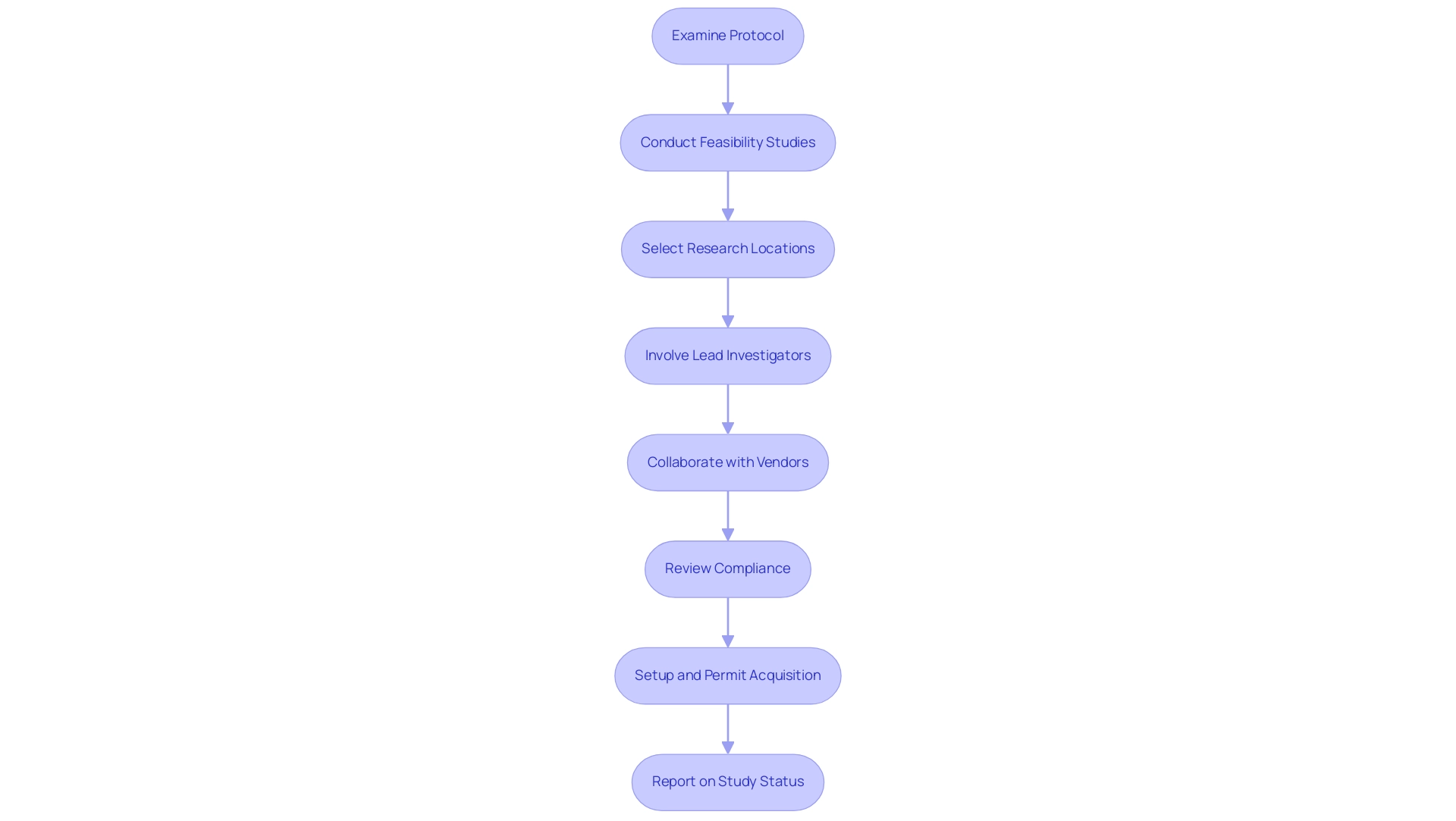
Conclusion
The management of clinical trial supplies is a critical factor that influences the success of research initiatives and advancements in healthcare. Throughout this article, the importance of effective logistics, regulatory compliance, and strategic vendor selection has been highlighted as essential components for ensuring that clinical trials operate smoothly and efficiently. By leveraging technology, organizations can enhance their supply chain management, allowing for better tracking and forecasting of supplies, ultimately safeguarding the integrity of the trial.
Moreover, fostering strong communication and collaboration among all stakeholders—including research teams, vendors, and regulatory bodies—proves vital in navigating the complexities associated with clinical trial logistics. As the landscape continues to evolve, the integration of digital technologies and adherence to regulatory standards will be crucial in mitigating risks and enhancing operational efficiency.
In conclusion, the successful execution of clinical trials hinges on a well-coordinated approach to supply management. By embracing best practices, investing in advanced systems, and prioritizing compliance, organizations can not only improve trial outcomes but also contribute to the broader goals of healthcare improvement and economic growth. As the demand for efficient clinical trial logistics continues to rise, the commitment to these principles will undoubtedly pave the way for future advancements in medical research and patient care.
Frequently Asked Questions
What are clinical trial supplies?
Clinical trial supplies include a variety of materials essential for conducting studies efficiently, such as investigational medicinal products (IMPs), placebos, syringes, vials, and storage equipment.
What percentage of the supply chain market for medical studies does logistics and services represent?
Logistics and services represent the largest portion, accounting for 25% of the supply chain market for medical studies in 2023.
What services are included in clinical research oversight?
The services encompass feasibility studies, site selection, compliance reviews, study setup, import permits, project coordination, and careful reporting.
Why is the compliance review process important?
The compliance review process ensures that all study documents meet regulatory standards, safeguarding the integrity of the study.
How does an advanced inventory control system benefit clinical trials?
An advanced inventory control system, such as Cloudbyz EDC 2.0, improves data handling capabilities and ensures better coordination of resource availability with testing schedules.
What can happen if there are shortages in clinical trial supplies?
Shortages can severely jeopardize the integrity and continuity of the study, significantly impacting outcomes.
What recent investment by Novartis highlights the importance of logistics oversight?
Novartis invested around USD 13 billion in R&D in 2022, emphasizing the necessity of effective logistics oversight for clinical trial supplies.
How did UPS enhance its logistics capabilities in 2022?
UPS strategically acquired Bomi Group in August 2022 to expand healthcare networks and add temperature-controlled facilities across 14 countries.
What role do logistics advancements play in clinical trials?
Advancements in logistics enhance service range and efficiency, ensuring the timely delivery of temperature-sensitive products, which is crucial for maintaining integrity.
What challenges complicate the management of clinical trial supplies?
Challenges include the geographical distribution of testing locations, managing temperature-sensitive supplies, and complying with customs regulations.
What is essential for navigating complexities in clinical trial logistics?
Fostering robust relationships with logistics partners who understand the unique demands of clinical trial supplies is essential.
Why is contingency planning important in logistics strategy?
Contingency planning is vital for anticipating potential disruptions and ensuring that clinical trial supplies reach study sites on time.
How can digital technologies enhance logistics oversight in clinical studies?
Digital technologies such as AI and blockchain can improve logistics oversight, although they require new skills for successful implementation.
What concern is raised by the decline in Clinical Research Nurses (CRNs) in the U.S.?
The decline raises concerns about the future of the profession and its potential impact on study logistics.
What does the Declaration of Helsinki emphasize about medical research?
It emphasizes that medical research involving human subjects must be conducted by individuals with appropriate ethics, scientific education, training, and qualifications.




